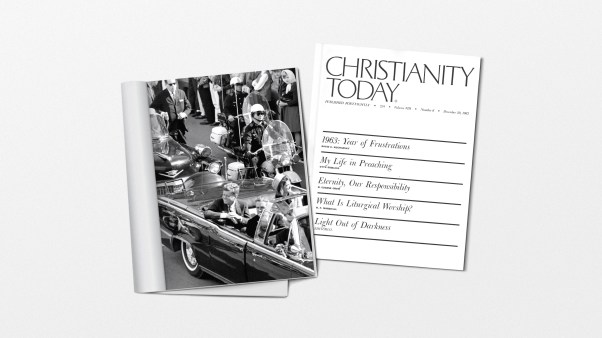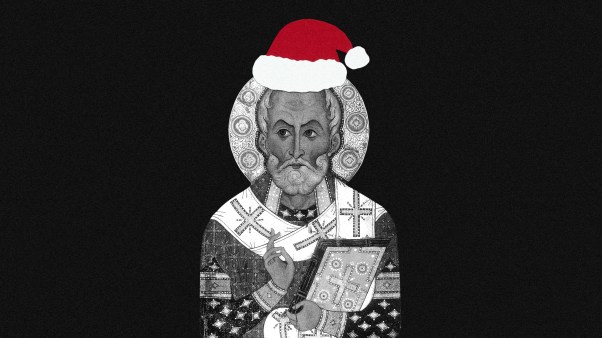Bush signs Unborn Victims of Violence ActThe president’s first bill signing ceremony of the year was for the Unborn Victims of Violence Act.
“Any time an expectant mother is a victim of violence, two lives are in the balance, each deserving protection, and each deserving justice,” President Bush said (text | audio | video). “If the crime is murder and the unborn child’s life ends, justice demands a full accounting under the law. … With this action, we widen the circle of compassion and inclusion in our society, and we reaffirm that the United States of America is building a culture of life.”
“This law does not impinge on abortion rights in any immediate sense,” says an editorial in today’s Washington Post. “It is, however, part of a long-term pattern in which legal abortion is surrounded by criminal laws and other regulations that protect fetuses and define them in legal terms as separate individuals. This new law will aid criminal enforcement only marginally; it will be another unwarranted step toward making constitutionally protected abortion seem an anomaly in the context of law.”
In other words: Gee, it seems a bit incongruous to say that the fetus is “member of the species homo sapiens” while we basically have abortion-on-demand in this country. Anyone disagree?
More news reports on the signing:
- Bush signs anti-violence law that extends into the womb | President Bush on Thursday signed legislation making it a separate crime to harm an embryo or fetus during the commission of a violent federal crime against a pregnant woman. And he declared that, with the new law, the United States was “building a culture of life” (Los Angeles Times)
- Bush signs unborn victims act | Federal law establishes 2 crimes against pregnant women (The Washington Post)
- Bush signs fetus-protection bill | President Bush yesterday signed legislation that criminalizes harming a fetus while assaulting a pregnant woman during a federal crime, the first national law granting an unborn child a status separate from the mother (The Washington Times)
- Bush signs rights-for-fetus law | President George W Bush has signed into law a measure that will expand the rights of the unborn child (BBC)
- Bush signs fetus rights legislation | President Bush invoked the case of pregnant murder victim Laci Peterson on Thursday as he signed legislation expanding legal rights of the unborn. “The suffering of two victims can never equal only one offense,” Bush said (Associated Press)
Interfaith group gets “scoop” on WMDs Well, um, you heard it here first. Unless you were at the annual dinner of the Palm Beach (Fla.) Fellowship of Christians and Jews Wednesday night.
John Loftus, the speaker at the interfaith gathering, says he and the U.S. government know the precise location of Saddam Hussein’s chemical and biological weapons—and they’ll tell the world about them after July 1, when the U.S. turns over control of the country.
Loftus, a former prosecutor for the U.S. Justice Department who claims the Bush family has Nazi connections and that Enron helped the Taliban’s 9/11 plans, says weapons stockpiles were moved from Iraq to Lebanon and Syria 10 weeks before the war started.
“These are huge stockpiles, and they are also almost adjacent to Al-Qaeda training camps, Hezbollah, Hamas, Islamic Jihad, he said. “They’re buried, but they won’t stay buried for long.”
Uh-huh. Well, thanks for that. As the Palm Beach Daily News dryly notes, “His statements have not been independently confirmed in the mainstream media.”
Clip and save University of North Carolina sociologist Christian Smith recently complained in Books & Culture (a CT sister publication) about “religiously ignorant journalists.” Among his complaints of reporters’ phone calls: “Other journalists simply cannot pronounce evangelicals at all. They get confused and flustered, and after a few uncomfortable tries at ‘evangelics’ and ‘evangelicalists’ they give up and resort to referring to evangelicals simply as ‘them.'”
Ah, but Dr. Smith, “how can they hear, unless someone tells them?” Without guidance, you end up with stories such as Rachel Uranga’s in the Los Angeles Daily News this week.
“After centuries of devotion to the Catholic faith, nearly 20 percent of U.S. Latinos have converted to evangelism over the last 10 years,” she writes. “Drawn to the no-nonsense sermons on pious, drug- and alcohol-free living, many Latinos say evangelism is a powerful antidote to everyday troubles plaguing their communities. … The shift among many Latino Catholics to evangelism, which started in Central America in the 1960s, is well under way in the San Fernando Valley.”
Now here’s the problem: Uranga actually has an interesting story here that may or may not be wholly accurate. The thesis is that Latinos, at least those in the Valley, are leaving Roman Catholicism for evangelical Protestant churches (largely of the independent and Pentecostal variety) because they sense that those churches have stronger moral teachings. If true, that’s an angle that’s gone largely unexplored in these stories.
And Uranga is no slouch: She was informed enough to contact DePaul University’s Arlene Sanchez-Walsh, one of the best scholars on Latino evangelicals.
But confusing the universal Christian action of evangelism with the mostly Protestant movement called evangelicalism (here’s a good definition of the latter) means that this story simply won’t (can’t) be taken seriously. And Daily News readers who know the difference—and that will include most Catholics—are going to be more likely dismiss future religion stories in the paper. And since the New York Times News Service picked up this story and it ran in other papers with the evangelism/evangelicalism problem in tact, the credibility problem may not be limited to the Daily News.
Regent College bookstore bans The Glorious Appearing That’s the Canadian home of J.I. Packer, John Stackhouse, Gordon Fee, and Eugene Peterson, not the Pat Robertson school in Virginia Beach.
Bookstore manager Ian Panth says the latest Left Behind book mixes “dangerous theology with politics” and (in the words of U.K.-based Ekklesia), “promoted an American-centric view that suggests that the US is beyond criticism.”
That shouldn’t keep the book from hitting the bestseller lists this week. And for precisely that reason, the many bookstores around Regent (except for that odd nautical bookstore) will likely carry the title anyway.
More articles
Bioethics council releases report:
- Reproduction and responsibility| The regulation of new biotechnologies (The President’s Council on Bioethics)
- America’s Catholic bishops respond | Today the President’s Council on Bioethics released a report on reproductive technologies that deserves attention from all concerned about technological abuse of human life. Unfortunately, two Council recommendations raise serious questions (United States Conference of Catholic Bishops)
- The bishops err | There have always been pro-lifers in the all-or-nothing camp: people who object to our trying to ban partial-birth abortions when all the other abortions are just as bad. The bishops’ conference has thankfully not been among their number. Until now (Ramesh Ponnuru, National Review Online)
- Greater regulation of fertility encouraged | Bioethics council seeking changes (The Washington Post)
- Bioethics panel recommends limits on assisted fertility | Advisers to President Bush urged restraints on the largely unregulated test-tube baby business but remained silent on some hot-button issues in assisted reproduction (The New York Times)
- Reproductive wrongs | Down the road, Congress might want to think harder about more extensive regulation of reproductive technologies (Editorial, The Washington Post)
Life ethics:
- In Albany appeals court ruling, mother and fetus are one | A mother whose unborn child dies because of a doctor’s negligence can now sue for the emotional distress she suffers, New York’s highest court ruled (The New York Times)
- A godsend, till a life unravels | Traci Johnson joined a clinical trial of an antidepressant to pay for college. The devout woman ended up taking her own life (Los Angeles Times)
- Pope declares feeding tubes a ‘moral obligation’ | Pope John Paul II has stunned Catholic health care providers, ethicists and theologians by announcing emphatically that it is “morally obligatory” to continue artificial feeding and hydration for people in a persistent vegetative state, even if they remain so for years (USA Today)
- Earlier: Pope declares feeding tube removal immoral | Pope John Paul II said Saturday the removal of feeding tubes from people in vegetative states was immoral, and that no judgment on their quality of life could justify such “euthanasia by omission” (Associated Press, Mar. 20)
- Schiavo was not victim of foul play, police say | The brain-damaged woman was returned to her nursing home after tests at a hospital (The Orlando Sentinel)
- One murder or two? | This new law will aid criminal enforcement only marginally; it will be another unwarranted step toward making constitutionally protected abortion seem an anomaly in the context of law (Editorial, The Washington Post)
Abortion:
- Abortion Dr. familiar with court scene | The scene unfolding in a federal courtroom here the past week is all too familiar to Dr. LeRoy Carhart (Associated Press)
- Dissension in prolife ranks over different means to same end | The Thomas More Law Center, a national public interest law firm based in Ann Arbor, Mich., is furious with the National Right to Life Committee and its South Dakota affiliate for “opposing and ultimately defeating a South Dakota law that would have banned virtually all abortions and challenged Roe v. Wade” (CNSNews.com)
Missionary killed in Uganda:
- Priest killed in Gulu | A Comboni missionary, Fr. Luciano Fulvi, was slain on Tuesday night by unknown people with an unknown motive (The Monitor, Kampala, Uganda)
- Italian priest killed | Sorrow gripped Gulu Archdiocese when an unknown assailant murdered a 76-year-old Italian Catholic priest in cold blood in Gulu Municipality (New Vision, Kampala, Uganda)
Church and state:
- Kerry, candidate and Catholic, creates uneasiness for church | Roman Catholic bishops are wondering how to respond to a presidential candidate who professes Catholicism while taking stands contrary to church teaching (The New York Times)
- Ten Commandments find place in ‘Heart’ of Lincoln County | It was Harold Baker’s church upbringing, he admits, that led him to take on his latest monumental task. Or rather, monument undertaking (The Advocate Messenger, Danville, Ky.)
- Evolving double standards | Establishing a state-funded church of Darwin (John G. West, National Review Online)
- Easter banner denied by ordinance | A 19-foot by 14-foot banner by Laguna artist Jeff LeFever will not be on display at the Festival of Arts (The Coastline Pilot, Laguna Beach, Ca.)
- Board digs in on gender | Three Westminster trustees maintain their stand against a state law despite fierce opposition at a packed meeting. Millions of dollars are at stake (Los Angeles Times)
- German state bans headscarves in schools | A conservative German state on Thursday became the nation’s first to ban Muslim teachers from wearing headscarves in public schools, taking a stand in a debate that has split public and political opinion (Associated Press)
- Also: German state backs headscarf ban (BBC)
Pledge:
- Student takes ‘under God’ out of pledge, feels the heat | A Spanaway Lake High School senior has been banned from TV production assignments for the rest of the year because he altered the Pledge of Allegiance during a student-produced broadcast (The News Tribune, Tacoma, Wa.)
- Does the Pledge of Allegiance endorse God? | Religious leaders respond (Los Angeles Times)
- Nice ‘God’ of the Pledge has no identity | The phrase “under God” in the Pledge of Allegiance is a placebo. The words provide a pleasant dose of sugary religion for the naive but mean nothing (Steve Gushee, Palm Beach Post)
Religious speech:
- Preachers’ rights not violated, judge says | Salt Lake City is justified in restricting street preachers who sermonize against the LDS Church to “standing zones” this weekend during the LDS Church conference, a federal judge ruled Thursday (The Salt Lake Tribune)
- Judge upholds buffer zones for preachers | The World Wide Street Preachers Fellowship quickly appealed a federal judge’s decision Thursday upholding Salt Lake City’s buffer zone plan for this weekend’s LDS general conference (Deseret Morning News, Ut.)
Missions & ministry:
- Addicts Victorious attempts to get users to submit themselves to Christ | With the use and manufacture of methamphetamine continually increasing in the Tri-State Area, the fallout from the drug is challenging state agencies that have had to cut services due to budget cuts, including law enforcement and social services (Daily Gate City, Keokuk, Ia.)
- Return of the native | A troupe from San Francisco uses traditional Hawaiian dance and modern extrapolation to tell how missionaries suppressed the islands’ culture (San Bernardino County Sun, Ca.)
- Bible-toting preacher leads a west side revival | Allen J. Landry preaches at a drafty but elegant 101-year-old house of worship on the Upper West Side (The New York Times)
- Newborn baby is found on bench in Brooklyn church | The baby was listed in stable condition at Brookdale University Hospital (The New York Times)
- Teen-rehab program told to shut down | Faith-based group accused of abuse (The Arizona Republic)
- The not-so-gay lifestyle | Pastoral care for homosexuals who want out (Mario Bergner, Leadership Journal)
Middle East:
- A solution for Arabs and Jews | Palestinian Arabs, Israeli Jews can find security only in one another (Fahed Abu-Akel, The Charlotte Observer, N.C.)
- Israeli police storm Jerusalem holy site | Hundreds of Palestinians have barricaded themselves inside the Temple Mount after Israeli police stormed a mosque firing plastic bullets, stun grenades and tear gas (The Daily Telegraph, London)
- Clashes erupt at al-Aqsa mosque | Israeli police have stormed the Temple Mount in Jerusalem and fired tear gas after Palestinian youths reportedly threw stones after Friday prayers (BBC)
Television:
- Romanian priests condemn sex on reality TV | Romanian priests are campaigning across the Balkan country to convince believers not to watch a popular reality TV show that has broadcast live sex, Romanian media says (Reuters)
- The ABC of Holy Week | With “Jesus and Paul,” Peter Jennings gets it right (Robert Louis Wilken, The Wall Street Journal)
- Americana, religion in films on TV | The movies on TV this week include some religious offerings, plus the more secular work of D.H. Lawrence (The Daily Herald, Everett, Wa.)
- Jim on Tammy | Jim Bakker speaks out for the first time about Tammy Faye Messner’s inoperable lung cancer (Larry King Live, CNN)
Popular religion:
- Ten commandments to turn Christian pop stars into real ones | Christian pop is, of course, the sort of thing pop columnists tend to be gratuitously mean about, so that was what I was planning to do. Until I realized how similar much of the album is to the proper pop charts (Andrew Eaton, The Scotsman)
- Gospel songs stir ‘The Ladykillers’ | Can T Bone Burnett’s new soundtrack album do for gospel what “O Brother” did for bluegrass? (The Washington Times)
- Bock takes on DaVinci Code’s view of history | Darrell L. Bock said he found it appropriate that he was delivering the 8th Annual Real Jesus Lecture on April Fools Day—he was discussing something that is, on one hand, fiction but claims to be fact (Yale Daily News, Yale U.)
- Born-again superstar | Everyone’s looking for meaning but no one expected Jesus to be such a lightning rod for it. Mel’s film, like The Da Vinci Code, has tapped into a wellspring of religious curiosity (John Carroll, The Sydney Morning Herald)
- ‘Gospel of John’ illustrates the story of Jesus’ teaching | Film should have a long life, especially on DVD, where Christians and other interested parties can watch it in small portions. (The Daily Herald, Everett, Wa.)
The Passion:
- Passion panned by French critics | The Passion of the Christ has been judged “sadistic”, “manipulative” and “boring” by French film critics (BBC)
- Gibson reshapes an American icon | David Denby’s Jesus is not so much the atoning savior of traditional Christianity as a man of unparalleled intellectual vigor (M.J. Andersen, The Providence Journal, R.I.)
- Beyond the Passion of our Christ | Watching films about Christ’s life on earth was a pastime for us as we grew up in Sierra Leone. But all the missionaries’ films I used to cherish were just the surface of what actually happened to Christ (Sheka Tarawalie, Concord Times, Freetown, Sierra Leone)
- Bahrain bans Gibson’s “The Passion of the Christ” | “It’s banned because it is against Islamic Sharia which forbids depicting the prophets,” says information ministry official (AFP)
- Two faces of fundamentalism | Mel Gibson and Osama bin Laden do not, on the face of it, have all that much in common. But an unusual coincidence of scheduling saw almost back-to-back documentaries on the two men with a claim to the mantle of society’s most prominent religious fundamentalists (Robert Shrimsley, Financial Times)
- Why the Jews are wrong | If you believe this film should not be shown, then you must believe the Bible should not be read. The Church should defend Mel Gibson’s offering with vigour, rather than its customary whimper that it doesn’t want anyone to be upset (Ann Widdecombe, The New Statesman, U.K.)
Spirituality:
- Inside with God | An ecumenical group of volunteers holds services at the Nassau County jail (Newsday, N.Y.)
- Praying on the fly | Another day, another message for the guest book in the chapel by Airside F. Some pray for peace, others for forgiveness. And some just want a good hair day (St. Petersburg Times, Fla.)
- Christians get Jewish education | Jonathan Bernd has a message not only for ethnic Jews like himself but also for the gentile Christian community (Clovis News Journal, N.M.)
- Ailing Summerall retains passion, humor | His memory rewinds, not for the purpose of summing up a life he doesn’t plan to continue, but to share an inner serenity he knows through hope and Christian faith (Frank Luksa, The Dallas Morning News)
- Brazil’s Catholic Church gets a nod and a shrug | In the world’s largest Roman Catholic population, indifference and dissent are visible. Now, priests and bishops are responding (Associated Press)
Books:
- More bookstores, fewer independents | Dallas has about 65 religious bookstores, up from 23 in 1991 (The Dallas Morning News)
- The 12th coming of less-than-glorious fiction | The latest “Left Behind” book (Carl E. Olson, National Review Online)
Pentecostal Bishop called heretic:
- Group says Pentecostal Bishop Pearson a `heretic’ for `inclusionism’ views | Statement from the Joint College of African-American Pentecostal Bishops Congress comes more than a year after Carlton Pearson addressed the organization at a Washington doctrinal forum (Religion News Service)
- Earlier: Called to Account | Tulsa Pentecostal pastor defends his universalism before bishops (Religion News Service, Apr. 30, 2003)
- Even earlier: Heresy Charge Torpedoes Pastor’s Political Debut | Tulsa Christian leaders reject Pearson’s ‘gospel of inclusion’ as universalism. (Christianity Today, June 12, 2002)
Church life:
- African Church leaders resolve their differences | The Archbishop of Cape Town has agreed to ‘strengthen’ the traditionalist position of the African Church on homosexuality in return for the backing of other African Provinces for the next Lambeth Conference to be held in South Africa in 2008 (The Church of England Newspaper)
- McGee asks church to alter TV spots | South Carolina athletic director Mike McGee asked a local church to alter television commercials it filmed inside Williams-Brice Stadium because they violate university policy (Associated Press)
Abuse:
- Religion Today: Fighting abuse among Jehovah’s Witnesses | While the clergy sex abuse crisis in the Roman Catholic Church has dominated headlines the past two years, smaller American religious bodies are dealing with variations on the same problem (Associated Press)
- With transfer of miter comes hope for trust | Diocese of Springfield’s newly installed 8th bishop apologizes to abuse victims, seeks church healing (The Boston Globe)
- Bishop stands by sex questionnaire | Bishop Piper says the document aims to ensure that those who are to be ministers in the diocese can be trusted (Australian Broadcasting Corp.)
Homosexuality:
- Gay soldiers and teachers | Strides in tolerance toward homosexuals on a range of issues in recent years gives reason to hope that gay marriage will eventually be deemed acceptable (Editorial, The New York Times)
- Bush backs policy against bias | President Bush yesterday backed the enforcement of workplace discrimination claims based on sexual orientation, challenging a decision by the head of the Office of Special Counsel to suspend enforcement in the federal workplace pending a legal analysis (The Washington Times)
- Lesbian minister’s acquittal criticized | Good News, which represents evangelical Methodists, is asking for a review by the Judicial Council, the denomination’s top court, of the church trial and verdict in the case of Rev. Karen Dammann. Good News also wants changes that would “close loopholes” in judicial proceedings (Chicago Tribune)
- Canadian homosexual hate crimes bill successfully delayed until at least April 20 | Bill will die if federal election is called in the meantime (LifeSite)
- Will law silence the church? | Christian leaders in Canada fear that a new law might de facto condemn portions of the Bible as hate literature (UPI)
Gay marriage:
- Lawmakers weigh in on gay marriage votes | The ban on same-sex marriage approved by the Georgia House on Wednesday was one of the Legislature’s most bitterly disputed issues in recent years (Macon Telegraph, Ga.)
- Mulling way to stop gay weddings | As SJC appeal ruled out, Romney eyes his options (The Boston Globe)
- Echoes of racism in gay marriage ban | It is appalling to see Reilly hide behind a law meant as a wink and a nod to segregation at the very time he, Romney, and the Legislature swear they are not creating second-class citizenship for gay couples (Derrick Z. Jackson, The Boston Globe)
More articles:
- Deport Fr. Carlos, UPDF says again | Security agencies have repeated a request to have Father Carlos Rodriquez deported (The Monitor, Kampala, Uganda)
- Religion news in brief | Challenging the Karen Dammann verdict, George Carey accused of prejudice, Pope recalls Rwanda genocide, and other stories (Associated Press)
- Heartening responses offer hope | I’d forgotten in today’s combative climate that Americans amply possess a strong sense of compassion and fair play (L.A. Chung, San Jose Mercury News, Ca.)
- Sin security | Investing in vice is not a bad idea (James K. Glassman, National Review Online)
- Pastors: Divorce, adultery a bigger threat to marriage | One of the great moral and political debates of 2004 concerns gay marriage and whether it would destroy the sanctity of marriage. However, some might say that as far as sacredness and marriage go, the sanctity as already been damaged——by heterosexuals, including many Christians (North County Times, San Diego, Ca.)
Copyright © 2004 Christianity Today. Click for reprint information.
Related Elsewhere:
Suggest links and stories by sending e-mail to weblog@christianitytoday.com
Check out Books & Culture‘s weblog, Content & Context.
See our past Weblog updates:
and more, back to November 1999








